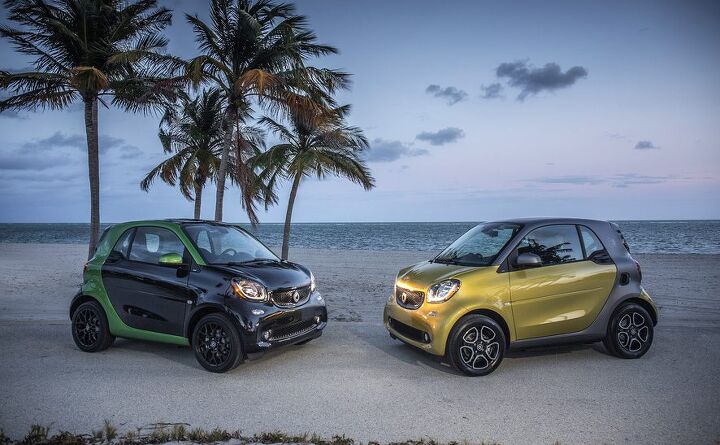Daimler's Smart Will Kill Its Internal Combustion Engines Before Year's End

It would appear that the Smart money is literally on electric cars. Daimler says it plans to stop selling combustion-engined Smart models in North America entirely. If you live in the United States or Canada and want a goofy gas-powered mini car, you’d better buy one now.
Mercedes-Benz USA CEO Dietmar Exler has issued a letter to dealers explaining that the sale of Smart cars with gasoline engines will stop when the 2017 model year ends this fall.
“Developments within the micro-car segment present some challenges for the current smart product portfolio,” Exler wrote in the letter obtained by Reuters. “A dedicated focus on the electric drive in the U.S. and Canada provides a logical step to support a sustainable, zero emissions future.”
According to Daimler, the change does not apply to other markets outside North America, where small cars sales haven’t weakened quite so badly. In fact, Smart’s European sales have bounced back sharply after a five-year slump that began in 2010. Last year was particularly good for the company across the pond, but the brand continued to flounder in both the United States and Canada.
Mercedes-Benz sold 8,086 Smart cars in North America last year, thanks largely to consistently lower gasoline prices and decreasing interest in small cars. Meanwhile, electric cars remain a niche but consistently growing segment. Despite the limitations of having a diminished range and no backseat, Smart’s Fortwo Electric Drive should remain the preeminent vehicle for on-street parking in the country’s densest cities.
Daimler has updated the little EV’s styling and battery for 2017. While the previous Smart EV petered out at 68 miles, the new model is is expected to be capable of a more-livable range close to 100 miles when it arrives this spring.
[Image: Mercedes-Benz]

A staunch consumer advocate tracking industry trends and regulation. Before joining TTAC, Matt spent a decade working for marketing and research firms based in NYC. Clients included several of the world’s largest automakers, global tire brands, and aftermarket part suppliers. Dissatisfied with the corporate world and resentful of having to wear suits everyday, he pivoted to writing about cars. Since then, that man has become an ardent supporter of the right-to-repair movement, been interviewed on the auto industry by national radio broadcasts, driven more rental cars than anyone ever should, participated in amateur rallying events, and received the requisite minimum training as sanctioned by the SCCA. Handy with a wrench, Matt grew up surrounded by Detroit auto workers and managed to get a pizza delivery job before he was legally eligible. He later found himself driving box trucks through Manhattan, guaranteeing future sympathy for actual truckers. He continues to conduct research pertaining to the automotive sector as an independent contractor and has since moved back to his native Michigan, closer to where the cars are born. A contrarian, Matt claims to prefer understeer — stating that front and all-wheel drive vehicles cater best to his driving style.
More by Matt Posky
Latest Car Reviews
Read moreLatest Product Reviews
Read moreRecent Comments
- Honda1 Unions were needed back in the early days, not needed know. There are plenty of rules and regulations and government agencies that keep companies in line. It's just a money grad and nothing more. Fain is a punk!
- 1995 SC If the necessary number of employees vote to unionize then yes, they should be unionized. That's how it works.
- Sobhuza Trooper That Dave Thomas fella sounds like the kind of twit who is oh-so-quick to tell us how easy and fun the bus is for any and all of your personal transportation needs. The time to get to and from the bus stop is never a concern. The time waiting for the bus is never a concern. The time waiting for a connection (if there is one) is never a concern. The weather is never a concern. Whatever you might be carrying or intend to purchase is never a concern. Nope, Boo Cars! Yeah Buses! Buses rule!Needless to say, these twits don't actual take the damn bus.
- MaintenanceCosts Nobody here seems to acknowledge that there are multiple use cases for cars.Some people spend all their time driving all over the country and need every mile and minute of time savings. ICE cars are better for them right now.Some people only drive locally and fly when they travel. For them, there's probably a range number that works, and they don't really need more. For the uses for which we use our EV, that would be around 150 miles. The other thing about a low range requirement is it can make 120V charging viable. If you don't drive more than an average of about 40 miles/day, you can probably get enough electrons through a wall outlet. We spent over two years charging our Bolt only through 120V, while our house was getting rebuilt, and never had an issue.Those are extremes. There are all sorts of use cases in between, which probably represent the majority of drivers. For some users, what's needed is more range. But I think for most users, what's needed is better charging. Retrofit apartment garages like Tim's with 240V outlets at every spot. Install more L3 chargers in supermarket parking lots and alongside gas stations. Make chargers that work like Tesla Superchargers as ubiquitous as gas stations, and EV charging will not be an issue for most users.
- MaintenanceCosts I don't have an opinion on whether any one plant unionizing is the right answer, but the employees sure need to have the right to organize. Unions or the credible threat of unionization are the only thing, history has proven, that can keep employers honest. Without it, we've seen over and over, the employers have complete power over the workers and feel free to exploit the workers however they see fit. (And don't tell me "oh, the workers can just leave" - in an oligopolistic industry, working conditions quickly converge, and there's not another employer right around the corner.)































Comments
Join the conversation
Also several Fiat 500e models for under $6k, with less than 30,000 miles.
Where are you going to charge the batteries if you live in a dense urban environment? I say this as a lifelong New York City resident.